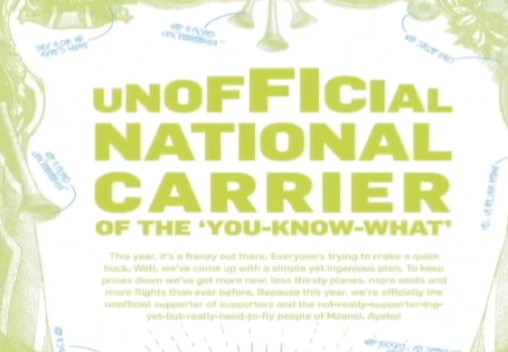

Johannesburg, South Africa (CNN) -- FIFA has come under fire from South African businesses upset with the tough trade restrictions put in place by soccer's world governing body for the 2010 World Cup.
FIFA makes the bulk of its money from selling marketing and television rights, and has already generated a record $3.3 billion ahead of the June 11 kickoff in Johannesburg.
Big companies pay big bucks to be associated with the tournament, and in return FIFA strictly enforces its trademark rules to protect its sponsors. Those who haven't paid for exclusive rights are barred from using symbols and words associated with the World Cup.
One recent high-profile case saw a budget South African airline forced to pull a marketing campaign.
When Kulula advertised itself as "the unofficial carrier of the 'you-know-what'," FIFA found nothing amusing about its choice of words or symbols.
It accused Kulula.com of ambush marketing and said the ad, which featured a picture of one of the World Cup stadiums, "created an unauthorized association" with the tournament.
"It's quite draconian and it's quite hard-hitting, but it would be tough to prove in court," Kulula marketing director Heidi Brauer told CNN.
Brauer said the company pulled the ad because it "had served its purpose, actually."
They cannot expect us to be just like Europe. This is the African continent, there is great under-development -- Cheche Selepe
The advert stirred up local emotions, and Kulula found itself leading a chorus of objections against what some in South Africa consider heavy-handed restrictions around an event they feel they should own.
However, FIFA argues that while it has created plenty of opportunities for South African companies to benefit from the tournament, it also has a responsibility to protect its sponsors.
"We have asked all our partners to work with South African companies, we have asked Adidas to work with South African companies and not to produce things in China or wherever," FIFA Secretary general Jerome Valcke told CNN.
"We have been asking all the companies we are working with to ensure they will train people from South Africa and ensure that it is part of the legacy."
It's not only big companies that are disgruntled -- many of the country's poor are angry.
South Africa has a vibrant informal trading sector, and football games have traditionally provided street vendors with an opportunity to sell their wares to thousands, but there will be none of that during the World Cup.
"A stadium is a FIFA perimeter, and within this perimeter there are people who have the rights to do things and others have no rights," Valcke said.
Informal traders' spokesperson Cheche Selepe believes FIFA should adjust its rules and allow non-sponsors to sell their merchandise inside the stadium perimeter.
"They cannot expect us to be just like Europe or another part of Europe," Selepe said.
"This is the African continent, there is great under-development. There is big poverty in the country and therefore the majority of those survive in the informal sector of the economy, so to push them aside will be a recipe for disaster as far as we are concerned."
But Valcke said FIFA would not change its rules.
"Again I'm sorry to say no and I'm the bad guy, and that is what I have to be because I have to make sure that all that we do is protected. It's not because we are coming to a third-world country," he said.
"South Africa is able to host the World Cup with stadiums which are nicer and bigger than [2006 hosts] Germany -- it's not a third-world country."
While FIFA and the South African government point to the improved infrastructure as a lasting benefit for all the nation's people, some are finding it hard to celebrate possible future gains.
"There is no deal, nothing in it for us -- nothing for the poor at all in this World Cup, there's nothing really to be cheerful about," Selepe said.
- Octopus Paul v Ahmadinejad [28/07]
- France suspend entire World Cup squ [24/07]
- Webb says World Cup final was taint [23/07]
- Goal-line technology off Fifa agend [20/07]
- World Cup final ball sold for £48K [18/07]
- Evra 'is being victimised', says Fe [17/07]
- Scolari says no offer yet to coach [16/07]
- Beckham: England players must take [15/07]
- Messi says WCup loss left him with [15/07]
- Now it's Brazil's turn to get ready [15/07]
| Years | Winners | Runner-up | Third place |
| 2006 | Italy | France | Germany |
| 2002 | Brazil | Germany | Turkey |
| 1998 | France | Brazil | Croatia |
| 1994 | Brazil | Italy | Sweden |
| 1990 | Germany | Argentina | Italy |
| 1986 | Argentina | Germany | France |
| 1982 | Italy | Germany | Poland |
| 1978 | Argentina | Holland | Brazil |
| 1974 | Germany | Holland | Poland |
| 1970 | Brazil | Italy | Germany |
| 1966 | England | Germany | Portugal |
| 1962 | Brazil | Czech | Chile |
| 1958 | Brazil | Sweden | France |
| 1954 | Germany | Hungary | Austria |
| 1950 | Uruguay | Brazil | Sweden |
| 1938 | Italy | Hungary | Brazil |
| 1934 | Italy | Czech | Germany |
| 1930 | Uruguay | Argentina | America |


